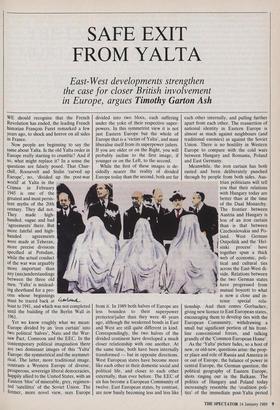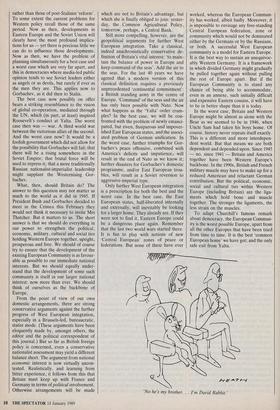SAFE EXIT FROM YALTA
East-West developments strengthen
WE should recognise that the French Revolution has ended, the leading French historian Francois Furet remarked a few years ago, to shock and horror on all sides in France.
Yet we know roughly what we mean: Europe divided by an 'iron curtain' into two political 'halves', Nato and the War- saw Pact, Comecon and the EEC. In the contemporary political imagination there are two dominant images of this 'Yalta' Europe: the symmetrical and the asymmet- rical. The latter, more traditional image, contrasts a Western Europe of diverse, prosperous, sovereign liberal democracies, happily allied to the United States, with an Eastern 'bloc' of miserable, grey, regimen- ted 'satellites' of the Soviet Union. The former, more novel view, sees Europe divided into two blocs, each suffering under the yoke of their respective super- powers. In this symmetrist view it is not just Eastern Europe but the whole of Europe that is a 'victim of Yalta', and must liberalise itself from its superpower jailers. If you are older or on the Right, you will probably incline to the first image; if younger or on the Left, to the second. While the first of these images is de- cidedly nearer the reality of divided Europe today than the second, both are far from it. In 1989 both halves of Europe are less bounden to their superpower protector/jailer than they were 40 years ago, although the weakened bonds in East and West are still quite different in kind. Correspondingly, the two halves of the divided continent have developed a much closer relationship with one another. At the same time, both have been internally transformed — but in opposite directions. West European states have become more like each other in their domestic social and political life, and closer to each other externally, than ever before. The EEC of six has become a European Community of twelve. East European states, by contrast, are now busily becoming less and less like each other internally, and pulling further apart from each other. The reassertion of national identity in Eastern Europe is almost as much against neighbours (and traditional enemies) as against the Soviet Union. There is no hostility in Western Europe to compare with the cold wars between Hungary and Romania, Poland and East Germany.
land. West German 1 Ostpolitik and the `I-lel- sinki process' have 1 together spun a thick web of economic, poli- tical and cultural ties \ across the East-West di- vide. Relations between the two German states have progressed from mutual boycott to what is now a close and in- tense special rela- tionship. And then comes Gorbachev, giving new licence to East European states, encouraging them to develop ties with the European Community, withdrawing a small but significant portion of his front- line conventional forces, and talking grandly of the 'Common European Home'.
As the 'Yalta' picture fades, so a host of new, or old-new, questions arise: the prop- er place and role of Russia and America in or out of Europe, the balance of power in central Europe, the German question, the political geography of Eastern Europe, shots ringing out in the Balkans. The politics of Hungary and Poland today increasingly resemble the 'coalition poli- tics' of the immediate post-Yalta period rather than those of post-Stalinist `reform'. To some extent the current problems for Western policy recall those of the same period. Now as then, developments in Eastern Europe and the Soviet Union will clearly have the most profound implica- tions for us — yet there is precious little we can do to influence those developments. Now as then, we have the problem of planning simultaneously for a best case and a worst case which are very far apart, and this in democracies where media-led public opinion tends to see Soviet leaders either as angels or as devils, but rarely if ever as the men they are. This applies now to Gorbachev, as it did then to Stalin.
The best case now possibly on offer bears a striking resemblance to the vision of global co-operation, mediated through the UN, which (in part, at least) inspired Roosevelt's conduct at Yalta. The worst case then was — war. A third world war between the victorious allies of the second. And the worst case now? It would be a foolish government which did not allow for the possibility that Gorbachev will fail; that there will be a rising somewhere in the Soviet Empire; that brutal force will be used to repress it; that a more traditionally Russian nationalist-imperialist leadership might supplant the Westernising Gor- bachev.
What, then, should Britain do? The answer to this question may not matter as much to the world as it did in 1945. If President Bush and Gorbachev decided to meet in the Crimea this February they would not think it necessary to invite Mrs Thatcher. But it matters to us. The short answer is that we should do everything in our power to strengthen the political, economic, military, cultural and social ties holding Western Europe together, upright, prosperous and free. We should of course try to ensure that the development of the existing European Community is as favour- able as possible to our immediate national interests. But we should equally under- stand that the development of some such community is itself in our larger national interest: now more than ever. We should think of ourselves as the backbone of Europe.
From the point of view of our own domestic arrangements, there are strong conservative arguments against the further progress of West European integration, especially in a Brussels-led, bureaucratic, statist mode. (These arguments have been eloquently made by, amongst others, the editor and the political correspondent of this journal.) But so far as British foreign policy is concerned, even a conservative nationalist assessment may yield a different balance sheet. The argument from national ,economic interest is now virtually uncon- tested. Realistically, and learning from bitter experience, it follows from this that Britain must keep up with France and Germany in terms of political involvement. Otherwise arrangements will be made which are not to Britain's advantage, but which she is finally obliged to join: yester- day, the Common Agricultural Policy, tomorrow, perhaps, a Central Bank.
Still more compelling, however, are the geopolitical arguments for further West European integration. Take a classical, indeed anachronistically conservative de- finition of Britain's vital interest: 'to main- tain the balance of power in Europe and keep command of the seas'. Add the air to the seas. For the last 40 years we have agreed that a modern version of this classical definition requires a previously unprecedented 'continental commitment': a British standing army in the centre of Europe. `Command' of the seas and the air has only been possible with Nato. Now what happens as the 'Yalta' order crum- ples? In the best case, we will be con- fronted with the problem of newly emanci- pated, but riven, fissiparous and impover- ished East European states, and the associ- ated problem of German unification. In the worst case, further triumphs for Gor- bachev's peace offensive, combined with America's deficits and impatiencef will result in the end of Nato as we know it; further disasters for Gorbachev's domestic programme, and/or East European trou- bles, will result in a Soviet reversion to aggressive-imperial type.
Only further West European integration is a prescription for both the best and the worst case. In the best case, the East European states, half-liberated internally and externally, will inevitably be looking for a larger home. They already are. If they were not to find it, Eastern Europe could be a dangerous place again. Remember that the last two world wars started there. It is fun to play with notions of new `Central European' zones of peace or federations. But none of these have ever worked, whereas the European Commun- ity has worked, albeit badly. Moreover, it is impossible to envisage any free-standing Central European federation, zone or community which would not be dominated either by the Germans or by the Russians, or both. A successful West European community is a model for Eastern Europe. It is the best way to sustain an unequivoc- ably Western Germany. It is a framework in which divided Germany might gradually be pulled together again without pulling the rest of Europe apart. But if the European Community is to stand any chance of being able to accommodate, even in an annexe, such initially difficult and expensive Eastern cousins, it will have to be in better shape than it is today.
In the worst case, Britain and Western Europe might be almost as alone with the Bear as we seemed to be in 1946, when Uncle Sam had taken his boys home. Of course, history never repeats itself exactly. This is a different and more interdepen- dent world. But that means we are both dependent and depended upon. Since 1945 — no, since 1941 — Britain and America together have been Western Europe's backbone. In the 1990s, British and French military muscle may have to make up for a reduced American and reluctant German contribution. But the political, economic, social and cultural ties within Western Europe (including Britain) are the liga- ments which hold bone and muscle together. The stronger the ligaments, the less strain on the muscles.
To adapt Churchill's famous remark about democracy, the European Commun- ity is the worst possible Europe, apart from all the other Europes that have been tried from time to time. It is the best `common European home' we have got; and the only safe exit from Yalta.
'No he's my brother. . . I'm David Rabbit.'



















































 Previous page
Previous page